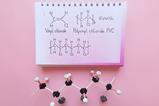Guide learners to work in groups to evaluate the statement by taking a closer look at the role plastic has in their everyday life
Ask your students to imagine a world without plastic. They should use the guided activities to assess the amount of plastic they use daily, consider alternatives and evaluate the statement with the evidence they have collected.
The activity worksheet asks learners how many times they have encountered plastic today, whether their shampoo is in a plastic bottle, or their clothes contain plastic fibres, for example.
In the Education in Chemistry article, Plastic fantastic the author has written: ’We all have homes filled with plastic … Life would be unrecognisable without it.’ Use the downloadable activity to help learners to decide if they agree with this statement.
Activity 1
Learners work in small groups to fill in the printable template with a list of 10–15 plastic items that they use every day. If learners know of a readily available alternative, they should add it to the last column.
Activity 2
Following activity 1, learners choose three items from their table that are easy to change and three which are not. For each of these items, learners need to write a sentence describing why they have chosen it and why it is difficult or easy to substitute. A printable template is provided to support this activity.
Activity 3
Learners will use the evidence they have gathered during the first two activities to evaluate the statement: ’We all have homes filled with plastic … Life would be unrecognisable without it.’ from the article. Learners need to draw on evidence that supports and opposes the statement. Their evaluation should include:
- evidence for the prevalence (or not) of plastic in everyday life.
- properties of plastic that make it a material of choice for so many different applications.
- an example of an item that could easily be swapped for an alternative.
- an example of an item that there is no suitable or easy alternative for.
- their opinion on the original statement.
Extension:
- Is it necessary to reduce the use of plastic in everyday life? Why, or why not?
- Discuss whose responsibility it should be to reduce plastic use. Should it be the consumer, the manufacturer or the government? What can you do?
Downloads
Life would be unrecognisable without plastic
Editable handout | Word, Size 76.45 kbLife would be unrecognisable without plastic
Handout | PDF, Size 0.22 mb























No comments yet